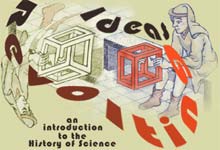
University of California, Irvine
Instructor: Dr. Barbara J. Becker

|
Week 1. Likely Stories The "Way of Truth" vs. the "Way of Seeming" |
Supplementary readings for Week 1's lectures include:
|
Late in his life, Plato (428-348 BCE) imagined a conversation among four intellectually curious friends. The participants included his teacher, Socrates (470-399 BCE); his great-grandfather, Critias; a visiting soldier-statesman, Hermocrates, and a fictional philosopher, Timaeus, who does most of the talking. The topic of discussion? Nothing less than the origin, structure, and nature of the world.
Before launching into his lengthy soliloquy, Timaeus cautions his listeners on the limits of human knowledge:
Don't ... be surprised, Socrates, if on many matters concerning the gods and the whole world of change we are unable in every respect and on every occasion to render consistent and accurate account. You must be satisfied if our account is as likely as any, remembering that both I and you who are sitting in judgment on it are merely human, and should not look for anything more than a likely story on such matters.The word "science" derives from the Latin word scire, which means "to know." What do we know about the natural world? How do we come to know it? And, when--if ever--can we be confident that our "knowledge" of how the world works is something more than just another "likely story"?
|